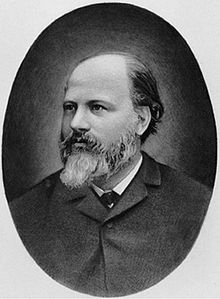Tommy Fallot
| Tommy Fallot | |
|---|---|
 |
|
| Born |
4 October 1844 Fouday, Bas-Rhin, France |
| Died | 3 September 1904 (aged 59) Mirabel-et-Blacons, Drôme, France |
| Nationality | French |
| Occupation | Lutheran Pastor |
| Known for | Social Christianity |
Tommy Fallot (4 October 1844 – 3 September 1904) was a French pastor who is known as the founder of Social Christianity in France.
Tommy Fallot was born on 4 October 1844 in Fouday, Bas-Rhin. His grandfather was Daniel Legrand (1783–1859), an industrialist and Christian in Ban de la Roche, Alsace who felt that the gospel message was primarily for the poor and unfortunate, despite their suffering. Fallot earn a doctorate in theology in Strasbourg in 1872. His thesis was on "The Poor and the Gospel". He spent four years as Lutheran pastor of Wildersbach, near the Ban de la Roche. He then left the Lutheran church and moved to Paris, where the Free Church had offered him a position.
Tommy Fallot was pastor at the Chapelle du Nord, a church of the Reformed Church of France (Église Réformée de France) on the rue des Petits-Hôtels in Paris. From there he led a program of evangelization among the working people. He was influenced by the work of the English clergyman Robert Whitaker McAll, who held "moral conferences" to carry the message of the Gospel to the poorest people. This followed the Réveil movement that had earlier swept 19th century Europe.
Fallot founded the French League for the Rehabilitation of Public Morality (Ligue pour le relèvement de la moralité publique), which gained widespread support in Paris and the provinces. By 1878 the future feminist Jeanne Schmahl had become active in Fallot's League, which was mainly concerned with abolition of alcohol and pornography. From 1882 Fallot also addressed the issue of prostitution. This was the outcome of a meeting with Josephine Butler (1828–1906), who was undertaking a campaign in England against this scourge.
Fallot began to adhere to socialist ideas, although condemning class warfare preached by leaders who "dream of revenge and conquest". Fallot founded the Cercle socialiste de la libre pensée chrétienne, which in 1882 became the Société d’aide fraternelle et d’études sociales. In 1887 Fallot and the economist Charles Gide founded the Protestant Association for Practical Study of Social Questions (Association protestante pour l'étude pratique des questions sociales). The association considered the social impact of industrialization from the perspective of liberal economics. It took the view that these impacts were unavoidable and had to be treated on a case by case basis. The association published the Journal of Practical Christianity (Revue du Christianisme pratique). Fallot is considered to be the founder of the French "Social Christianity" movement.
...
Wikipedia
